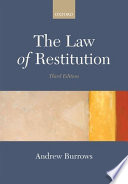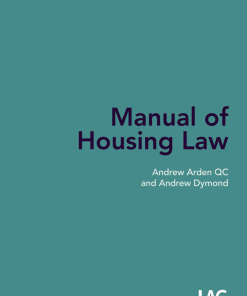The Law of Restitution 3rd Edition by Andrew Burrows 9780192549198 0192549197
$50.00 Original price was: $50.00.$25.00Current price is: $25.00.
The Law of Restitution 3rd Edition Andrew Burrows Andrew S Burrows – Ebook PDF Instant Download/Delivery, ISBN: 9780192549198, 0192549197

Product details:
- ISBN 10:0192549197
- ISBN 13:9780192549198
- Author: Andrew Burrows
The Law of Restitution
Table contents:
Part One: Fundamental Ideas
1 Introduction to Unjust Enrichment And Restitution
1. Recognition of a law of restitution based on the principle of reversing unjust enrichment
2. Developments since Lipkin Gorman v Karpnale Ltd
3. Restitution of an unjust enrichment and restitution for wrongs
4. Restitution beyond unjust enrichment and wrongs?
5. Restitutionary rights and remedies
6. Common law and equity
7. The essential ingredients of a claim for restitution of an unjust enrichment
2 Competing Theories
1. Implied contract
2. Stoljar’s proprietary theory
3. Unjust sacrifice
4. The views of Dietrich, Jackman and Jaffey
5. Hedley’s critique
6. The scepticism of the High Court of Australia
3 Benefit
1. Introduction
2. Objective benefit
3. Overcoming subjective devaluation
4. Subjective overvaluation?
5. Edelman’s approach
6. Separation of the benefit and injustice enquiries
4 At The Expense Of The Claimant
1. Introduction
2. The correspondence question
3. The third party question
5 Unjust Factors Or Absence Of Basis?
1. Unjust factors
2. Absence of basis
6 Tracing
1. What is tracing?
2. Tracing at common law
3. Tracing in equity
4. Conclusion
7 Subrogation
1. Introduction
2. Subrogation to extinguished rights
3. Subrogation to subsisting rights
4. Conclusion
8 Proprietary Restitution
1. Introduction
2. Newly created, not pre-existing, proprietary rights
3. Proprietary rights, after unauthorised substitution, reverse unjust enrichment
4. Other examples of proprietary restitution reversing unjust enrichment
5. What is the justification for proprietary restitution?
6. Critics rejecting the unjust enrichment analysis of proprietary restitution
7. McFarlane’s re-analysis of equitable proprietary rights under a trust
8. The contrast with the approach in the United States
9. Does retention of title preclude unjust enrichment?
Part Two Unjust Factors
9 Mistake
1. Introduction
2. Mistaken payments
3. Benefits in kind rendered by mistake
4. Rescission of an executed contract entered into by mistake
10 Duress
1. Introduction
2. Duress of the person
3. Duress of goods
4. Illegitimate threats (other than by a public authority ultra vires) made to support a demand for payment in excess of what is permitted by statute
5. Economic duress
6. Illegitimate threats to prosecute or sue or publish information
11 Undue Influence
1. Introduction
2. Actual undue influence
3. Presumed undue influence
12 Exploitation Of Weakness
1. Introduction
2. Exploitation of the claimant’s mental weakness
3. Exploitation of the claimant’s circumstantial weakness (ie, difficult circumstances)
4. Illegality designed to protect a vulnerable class from exploitation
5. Conclusion
13 Human Incapacity
1. Infancy
2. Mental incapacity and drunkenness
14 Failure Of Consideration I
1. Introduction
2. What is meant by failure of consideration?
3. Is it a prerequsite for failure of consideration that any relevant contract be ineffective?
4. Should it be necessary for the failure of consideration to be total?
5. Is free acceptance an unjust factor?
15 Failure Of Consideration Ii
1. Introduction
2. Contracts discharged for breach
3. Contracts discharged by frustration
4. Incomplete or anticipated contracts
5. Contracts unenforceable for want of formality
6. Void contracts
7. Failure of consideration as the failure of an unpromised future event
8. Proprietary restitution in respect of payments made for a failed consideration
16 Ignorance
1. The argument for recognising ignorance
2. Two-party cases
3. Standard three-party cases: X transfers C’s property, or its substitute, to D
4. Other three-party cases
5. Proprietary restitution in respect of property transferred without the owner’s knowledge
6. Conclusion
17 Legal Compulsion: Compulsory Discharge Of Another’S Legal Liability
1. Introduction
2. Legal compulsion: restitution by recoupment
3. Legal compulsion: restitution by contribution
4. When does payment of another’s debt discharge that debt?
18 Necessity
1. Introduction
2. The case law granting a remedy to the necessitous intervener
3. Authorities hostile to the necessitous intervener
4. An unjust enrichment analysis
5. Conclusion
19 Illegality
1. Illegality as a ground for restitution and illegality as a defence
2. Encouraging the abandonment of an illegal purpose: withdrawal in the locus poenitentiae
20 Public Authority Ultra Vires Exaction And Payment
1. Ultra vires exaction by a public authority
2. Ultra vires payment by a public authority
Part Three Defences
21 Change Of Position, Estoppel, And The Defence Of Agency
1. Introduction to defences
2. Change of position
3. Estoppel
4. Agency as a defence
22 Other Defences
1. Counter-restitution
2. Bona fide purchase from a third party
3. Incapacity as a defence
4. Illegality as a defence
5. Dispute resolved
6. Limitation
7. Passing on
Part Four Restitution For Wrongs
23 Introduction To Restitution For Wrongs
1. Introduction
2. What is a civil wrong?
3. Concurrent liability
4. Classification
5. Causation
6. Enrichment
7. Restitutionary rights and remedies
8. Compensation and restitution for a wrong?
9. Multiple defendants
10. Multiple claimants
11. Edelman’s thesis
12. Compensation for a lost opportunity to bargain?
13. Stevens’ substitutive damages thesis
14. Restitution for crimes
24 Restitution For Torts
1. Meaning of ‘waiver of tort’
2. Case law supporting restitution for torts
3. Some significant anti-restitution cases?
4. What should the law be on restitution for torts?
25 Restitution For Breach Of Contract
1. Restitution for a wrong and restitution of an unjust enrichment
2. The law prior to Blake: no restitution subject to a rare exception
3. Attorney General v Blake
4. Cases subsequent to Blake
5. Conclusion on the law subsequent to Blake
26 Restitution For Equitable Wrongs
1. Introduction
2. Restitution for breach of fiduciary duty
3. Restitution for breach of confidence
4. Conclusion
27 Defences To Restitution For Wrongs
1. Change of position?
2. Incapacity as a defence to restitution for wrongs
3. Limitation
Part Five Conflict Of Laws
28 The Conflict Of Laws
1. Jurisdiction
2. Choice of law
People also search:
the law of restitution
goff and jones the law of restitution
the principles of the law of restitution
principles of the law of restitution in singapore
burrows the law of restitution
You may also like…
Commercial & Financial Law
Jurisprudence & Law - Real Estate & Property Law
MANUAL OF HOUSING LAW 11th Edition by Andrew Arden, Andrew Dymond ISBN 9781912273928 1912273926
Jurisprudence & Law - Tort & Liability Law
Remedies for Torts Breach of Contract and Equitable Wrongs 4th Edition Andrew Burrows
Technique - Patent Business. Ingenuity. Innovation
Growth Management Issues Techniques and Policy Implications 1st Edition Lawrence B. Burrows
Chemistry - Physical Chemistry
Chemistry 3 introducing inorganic organic and physical chemistry 2nd Edition Burrows
Poetry - American Poetry











